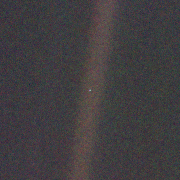Space is Not a Luxury

The Planetary Society is an organization dedicated to human exploration of space and advancement of science. I’ve been a member off and on over the years and applaud the work this group does to bring awareness of space and science to the public. Recently they sent around a statement from their board of directors about science and research that resonates quite deeply with me.
Rather than paraphrase it, I’m reprinting below because I think it’s important to remember that the correct applications of scientific knowledge by nations around the globe will help bring about a more positive future for everyone our our pale blue dot of a planet.
Science is an imperative. Space is not a luxury. We cannot walk away from these endeavors without damaging our future on this planet.
In light of the economic turmoil currently roiling nations around the globe, The Planetary Society’s Board of Directors believes that it is vital that we not lose sight of the importance and long-term economic benefit of maintaining a strong commitment to scientific research, including space exploration. Today the Board issued the following statement:
To safeguard humanity’s home planet and better understand the universe that surrounds it, we need a vibrant and diverse space program, forged through global cooperation that shares the tasks, shares the benefits, and shares the costs. Whatever the immediate economic problems may be, we believe that strong space programs should continue to be important priorities for both the US and other nations.
From monitoring Earth from space to studying long-term climate change on other worlds, the space program enables scientists to paint the big picture helping us to better understand the global forces that affect us all. No one nation alone benefits from better understanding that picture, and to paint it large and detailed enough, no one nation alone can bear the expense.
Space exploration programs not only provide a peaceful context for global engagement, but also contribute to skilled workforces and new technologies in participating nations, inspiring students to enter science and engineering fields. Observing Earth from space and understanding our planetary environment are as crucial to our survival as are the basics of a good economy.
As Voyager 1 prepared to leave our planetary neighborhood, Carl Sagan, co-founder of The Planetary Society, suggested the spacecraft be turned for one last look at its home planet. The resulting image of Earth as a single blue point of light gave us a profound new view of our world from a perspective possible only through space exploration.
Sagan wrote, “It has been said that astronomy is a humbling and character-building experience. There is perhaps no better demonstration of the folly of human conceits than this distant image of our tiny world. To me, it underscores our responsibility to deal more kindly with one another, and to preserve and cherish the pale blue dot, the only home we’ve ever known.”

